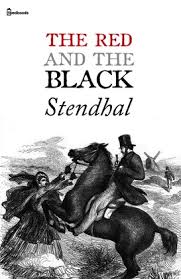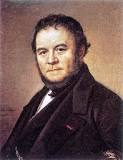The Red and the Black Page #8
Le Rouge et le Noir is a historical psychological novel in two volumes by Stendhal, published in 1830. It chronicles the attempts of a provincial young man to rise socially beyond his modest upbringing through a combination of talent, hard work, deception, and hypocrisy.
It was in vain that he called Julien two or three times. It was the young man's concentration on his book, rather than the din made by the saw, which prevented him from hearing his father's terrible voice. At last the latter, in spite of his age, jumped nimbly on to the tree that was undergoing the action of the saw, and from there on to the cross-bar that supported the roof. A violent blow made the book which Julien held, go flying into the stream; a second blow on the head, equally violent, which took the form of a box on the ears, made him lose his balance. He was on the point of falling twelve or fifteen feet lower down into the middle of the levers of the running machinery which would have cut him to pieces, but his father caught him as he fell, in his left hand. "So that's it, is it, lazy bones! always going to read your damned books are you, when you're keeping watch on the saw? You read them in the evening if you want to, when you go to play the fool at the curé's, that's the proper time." Although stunned by the force of the blow and bleeding profusely, Julien went back to his official post by the side of the saw. He had tears in his eyes, less by reason of the physical pain than on account of the loss of his beloved book. "Get down, you beast, when I am talking to you," the noise of the machinery prevented Julien from hearing this order. His father, who had gone down did not wish to give himself the trouble of climbing up on to the machinery again, and went to fetch a long fork used for bringing down nuts, with which he struck him on the shoulder. Julien had scarcely reached the ground, when old Sorel chased him roughly in front of him and pushed him roughly towards the house. "God knows what he is going to do with me," said the young man to himself. As he passed, he looked sorrowfully into the stream into which his book had fallen, it was the one that he held dearest of all, the Memorial of St. Helena. He had purple cheeks and downcast eyes. He was a young man of eighteen to nineteen years old, and of puny appearance, with irregular but delicate features, and an aquiline nose. The big black eyes which betokened in their tranquil moments a temperament at once fiery and reflective were at the present moment animated by an expression of the most ferocious hate. Dark chestnut hair, which came low down over his brow, made his forehead appear small and gave him a sinister look during his angry moods. It is doubtful if any face out of all the innumerable varieties of the human physiognomy was ever distinguished by a more arresting individuality. A supple well-knit figure, indicated agility rather than strength. His air of extreme pensiveness and his great pallor had given his father the idea that he would not live, or that if he did, it would only be to be a burden to his family. The butt of the whole house, he hated his brothers and his father. He was regularly beaten in the Sunday sports in the public square. A little less than a year ago his pretty face had begun to win him some sympathy among the young girls. Universally despised as a weakling, Julien had adored that old Surgeon-Major, who had one day dared to talk to the mayor on the subject of the plane trees. This Surgeon had sometimes paid Father Sorel for taking his son for a day, and had taught him Latin and History, that is to say the 1796 Campaign in Italy which was all the history he knew. When he died, he had bequeathed his Cross of the Legion of Honour, his arrears of half pay, and thirty or forty volumes, of which the most precious had just fallen into the public stream, which had been diverted owing to the influence of M. the Mayor. Scarcely had he entered the house, when Julien felt his shoulder gripped by his father's powerful hand; he trembled, expecting some blows. "Answer me without lying," cried the harsh voice of the old peasant in his ears, while his hand turned him round and round, like a child's hand turns round a lead soldier. The big black eyes of Julien filled with tears, and were confronted by the small grey eyes of the old carpenter, who looked as if he meant to read to the very bottom of his soul. CHAPTER V A NEGOTIATION Cunctando restituit rem.--Ennius. "Answer me without lies, if you can, you damned dog, how did you get to know Madame de Rênal? When did you speak to her?" "I have never spoken to her," answered Julien, "I have only seen that lady in church." "You must have looked at her, you impudent rascal." "Not once! you know, I only see God in church," answered Julien, with a little hypocritical air, well suited, so he thought, to keep off the parental claws. "None the less there's something that does not meet the eye," answered the cunning peasant. He was then silent for a moment. "But I shall never get anything out of you, you damned hypocrite," he went on. "As a matter of fact, I am going to get rid of you, and my saw-mill will go all the better for it. You have nobbled the curate, or somebody else, who has got you a good place. Run along and pack your traps, and I will take you to M. de Rênal's, where you are going to be tutor to his children." "What shall I get for that?" "Board, clothing, and three hundred francs salary." "I do not want to be a servant." "Who's talking of being a servant, you brute, do you think I want my son to be a servant?" "But with whom shall I have my meals?" This question discomforted old Sorel, who felt he might possibly commit some imprudence if he went on talking. He burst out against Julien, flung insult after insult at him, accused him of gluttony, and left him to go and consult his other sons. Julien saw them afterwards, each one leaning on his axe and holding counsel. Having looked at them for a long time, Julien saw that he could find out nothing, and went and stationed himself on the other side of the saw in order to avoid being surprised. He wanted to think over this unexpected piece of news, which changed his whole life, but he felt himself unable to consider the matter prudently, his imagination being concentrated in wondering what he would see in M. de Rênal's fine mansion. "I must give all that up," he said to himself, "rather than let myself be reduced to eating with the servants. My father would like to force me to it. I would rather die. I have fifteen francs and eight sous of savings. I will run away to-night; I will go across country by paths where there are no gendarmes to be feared, and in two days I shall be at Besançon. I will enlist as a soldier there, and, if necessary, I will cross into Switzerland. But in that case, no more advancement, it will be all up with my being a priest, that fine career which may lead to anything." This abhorrence of eating with the servants was not really natural to Julien; he would have done things quite, if not more, disagreeable in order to get on. He derived this repugnance from the Confessions of Rousseau. It was the only book by whose help his imagination endeavoured to construct the world. The collection of the Bulletins of the Grand Army, and the Memorial of St. Helena completed his Koran. He would have died for these three works. He never believed in any other. To use a phrase of the old Surgeon-Major, he regarded all the other books in the world as packs of lies, written by rogues in order to get on.
Translation
Translate and read this book in other languages:
Select another language:
- - Select -
- 简体中文 (Chinese - Simplified)
- 繁體中文 (Chinese - Traditional)
- Español (Spanish)
- Esperanto (Esperanto)
- 日本語 (Japanese)
- Português (Portuguese)
- Deutsch (German)
- العربية (Arabic)
- Français (French)
- Русский (Russian)
- ಕನ್ನಡ (Kannada)
- 한국어 (Korean)
- עברית (Hebrew)
- Gaeilge (Irish)
- Українська (Ukrainian)
- اردو (Urdu)
- Magyar (Hungarian)
- मानक हिन्दी (Hindi)
- Indonesia (Indonesian)
- Italiano (Italian)
- தமிழ் (Tamil)
- Türkçe (Turkish)
- తెలుగు (Telugu)
- ภาษาไทย (Thai)
- Tiếng Việt (Vietnamese)
- Čeština (Czech)
- Polski (Polish)
- Bahasa Indonesia (Indonesian)
- Românește (Romanian)
- Nederlands (Dutch)
- Ελληνικά (Greek)
- Latinum (Latin)
- Svenska (Swedish)
- Dansk (Danish)
- Suomi (Finnish)
- فارسی (Persian)
- ייִדיש (Yiddish)
- հայերեն (Armenian)
- Norsk (Norwegian)
- English (English)
Citation
Use the citation below to add this book to your bibliography:
Style:MLAChicagoAPA
"The Red and the Black Books." Literature.com. STANDS4 LLC, 2025. Web. 8 Mar. 2025. <https://www.literature.com/book/the_red_and_the_black_201>.








Discuss this The Red and the Black book with the community:
Report Comment
We're doing our best to make sure our content is useful, accurate and safe.
If by any chance you spot an inappropriate comment while navigating through our website please use this form to let us know, and we'll take care of it shortly.
Attachment
You need to be logged in to favorite.
Log In